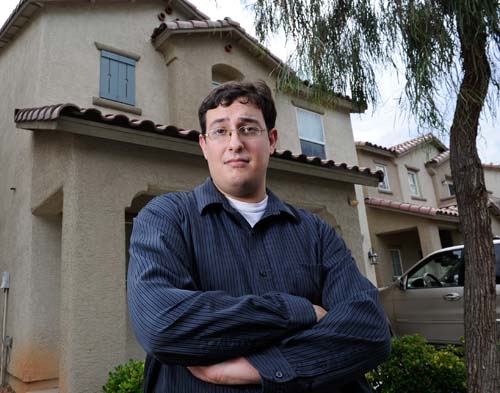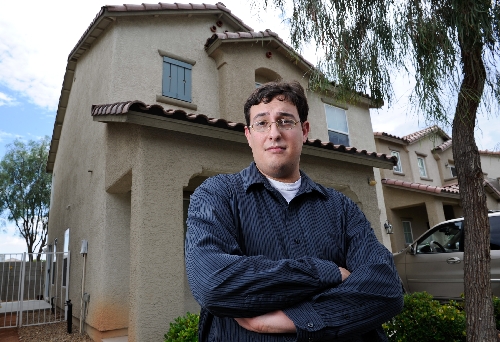House hunter discovers cash is king in Las Vegas
Aaron Kessler's a desperate man.
The Las Vegan has made nine propositions since February. He's hired professionals to help him find the right one. He's even taken to the Internet to advertise his ideal prospect and beg for help with his hunt.
Kessler's quarry? A house.
Don't tell Kessler Las Vegas is a homebuyers' nirvana. Four banks have prequalified him. He has a longtime job in the sports book at the Golden Nugget. He's paid off his debts and has a little money saved. Yet, every time he's made an offer, someone else has swooped in - usually an investor with cash, often with a much higher bid - to snatch the property from his clutches. In one case, Kessler offered $138,500 for a $124,900 house and got rejected. His bid was the third-highest.
"I've been getting outbid by cash offers fairly consistently, and it's a very frustrating process," Kessler said. "When people say this is a buyers' market, I start to wonder if they're delusional, because that couldn't be farther from the truth."
Christopher Rubeis, a Realtor with Realty Executives, said Las Vegas is a buyers' market only in regard to price. In reality, it's practically impossible for someone relying on a mortgage to buy here today, Rubeis said. There are just too many people chasing too few homes.
In a clash between investors who pay cash and mortgage-backed buyers who plan to live in their homes, the financed buyer loses almost every time: In the past 10 months or so, more than 90 percent of Rubeis' sales on homes priced below $125,000 have gone to cash buyers.
The market's tilt toward cash investors has observers watching for potential problems ranging from out-migration to another housing bubble. And for now, nobody seems to have many solutions.
INVESTORS DOMINATE THE GAME
Cash has long reigned in the local market. The Greater Las Vegas Association of Realtors first noted the phenomenon in February 2011, when it reported that cash buyers made up 51 percent of all local buyers. It was the first time cash transactions were the majority of sales here or perhaps anywhere in the country, group officials said.
The trend has intensified. Association numbers show 54 percent of buyers paid cash for existing homes in June.
No one tracks what percentage of cash buyers are investors, but association President Kolleen Kelley said most are.
Investors remain hot on Las Vegas because homes here are undervalued, Kelley said. The median home price for a single-family home was $131,785 in June, down from a peak of $290,000 in fall 2006 and below a national average of $190,100. In California, a big feeder market for local investors, the median single-family price was $320,540. Investors can find even better deals on attached housing. Among condos and townhomes, the local median was $69,000 in June, compared with $205,000 in mid-2006.
Low prices attract a frenzy of buyers even as home supplies shrink. The Realtors' association reported that 3,690 single-family homes were on the market with no offers pending in June, down 2.9 percent from May and 67.5 percent compared with June 2011. Condo and townhome listings were down 59.2 percent year-over-year, to 1,083 units.
A healthy local market would have 12,000 to 15,000 available listings, Rubeis said. Right now, 5,000 people a month are chasing about 3,500 available homes.
Blame the supply crunch on Assembly Bill 284, Rubeis said. The 2011 law requires agents who sign off on foreclosures to have personal knowledge of the lender's authority to foreclose. Faced with "the burden of corporate knowledge," banks backed off on defaults, Rubeis said. Foreclosure starts plummeted more than 80 percent in some months after the law took effect.
The shortage is so bad that "even if you include beat-up homes, there aren't many available," Kessler said.
Market dynamics can explain only some of the financed-buyer shutout.
If cash-flush investors are keen on Vegas, well, the feeling's mutual: Local sellers love cash, and they gravitate toward investors who pay them, in full, now.
CASH 'A MUCH SAFER DEAL'
A cash offer means a deal closes in as few as five days, Kelley said. Sell to a mortgage-backed buyer, and you're looking at 45 to 60 days before closing. Plus, appraisals aren't necessary on cash sales, so the closing has fewer costs and hassles.
Plus, many homes on today's market aren't mortgage-worthy. They're missing appliances or are in such poor condition that banks won't lend without major fixes. Cash buyers come to the rescue.
Nor are mortgages a sure bet. A bank could kill a deal at the last minute because of the home's condition or because the buyer bought a new car during underwriting and ruined his debt-to-income ratio.
"If I have a client and we have seven offers, all above list price, with comparable conditions in the contract, I cannot sit across from them at the table and tell them not to go with the cash offer," Rubeis said. "It's a much safer deal."
So financed borrowers have virtually no chance in the local market.
Rubeis said he's working with a dozen financed buyers who have made as many as 40 offers. They have FHA financing in place, with 3.5 percent down, and FICO scores of 750. They offer list price or above, and ask for few concessions. Some of them are first-time buyers. One, a coach at the University of Nevada, Las Vegas, has placed 36 offers in five months and seen every deal rejected.
Kelley said some properties get as many as 15 offers on them.
"Sellers certainly will put cash buyers in front of mortgaged buyers, and that's absolutely displacing" owner-occupiers who intend to live in the home they buy.
That could mean problems for the market down the road.
For starters, it's not good to turn away people who want to commit to the community by buying a home. It's probably one of the best times to buy, Kelley said, and people who want to buy homes to live in, rather than rent out, can't get a break.
"People with mortgages are buying homes to be an owner-occupier. There's a true need for a home there, whereas an investor may be buying his 12th or 15th property, so the need is not as great," Kelley said. "Do we run the risk of actually having people move out of the community because we can't physically get them something they need?"
Added Rubeis: "If you have a lot more investors, the general public gets frustrated trying to purchase. It's not a good thing any way you look at it. There are good people who should be able to get properties who aren't able to."
Nor do investors develop emotional ties to the community, Kessler added.
"I think it's terrible, because investors don't care about upkeep," he said. "I've lived in rented homes before and it's not the same. You're getting people who don't care about the neighborhood."
SETTING UP ANOTHER BUBBLE?
Even worse, the flood of investors could be setting up the market for another bubble.
Kelley said she's not concerned about an overheated market, because investors have different circumstances and aren't likely to try flipping homes en masse.
But Rubeis sounded an alarm.
He estimates the foreclosure bottleneck will last two more years. After that? The logjam that AB 284 created will clear and homes will flood the market. He counts 100,000 local homes that are empty or that have residents who aren't paying the mortgage. Those properties will hit the market, possibly at the same time, and the glut could sink values once again. Panicky investors could compound the problem by dumping their properties as soon as prices begin to slide. Rubeis said he's so worried about the potential scenario that he discloses it to all of his buyers.
The best solution would be to fix AB 284 so that properties could trickle onto the market over time, Rubeis said. That would both relieve current demand and ease future oversupply.
Absent any reforms, which likely wouldn't come before the Legislature meets in February, it's buyer be proactive.
If you see a home you like, move fast. Don't think about it for a day or two. Make your offer at least as high as the neighborhood's recent comparable sales. And forget about concessions. Asking sellers to contribute to closing costs, offer a home warranty or help with common-interest-community transfer fees may work in a true buyers' market. Today, those demands can scuttle deals, Rubeis said.
Kessler is trying another approach.
To publicize his plight, he launched a website, www.pleasejustsellmeahousealready.com. The site explains what he's looking for and has a blog detailing his offering woes. Beyond taking an unusual tack, Kessler said he really doesn't have much advice for buyers in his boat.
"All I can really say is, overbid as far as you can without completely overpaying for the house and overextending yourself. Be ready to bid well more than the listing price, though I haven't had success yet doing that.
"I wish everyone else success. I'd like to see a lot of people get in the market and get a house, but let me get mine first."
Contact reporter Jennifer Robison at j
robison@reviewjournal.com or 702-380-4512.
Follow @JRobison1 on Twitter.





























